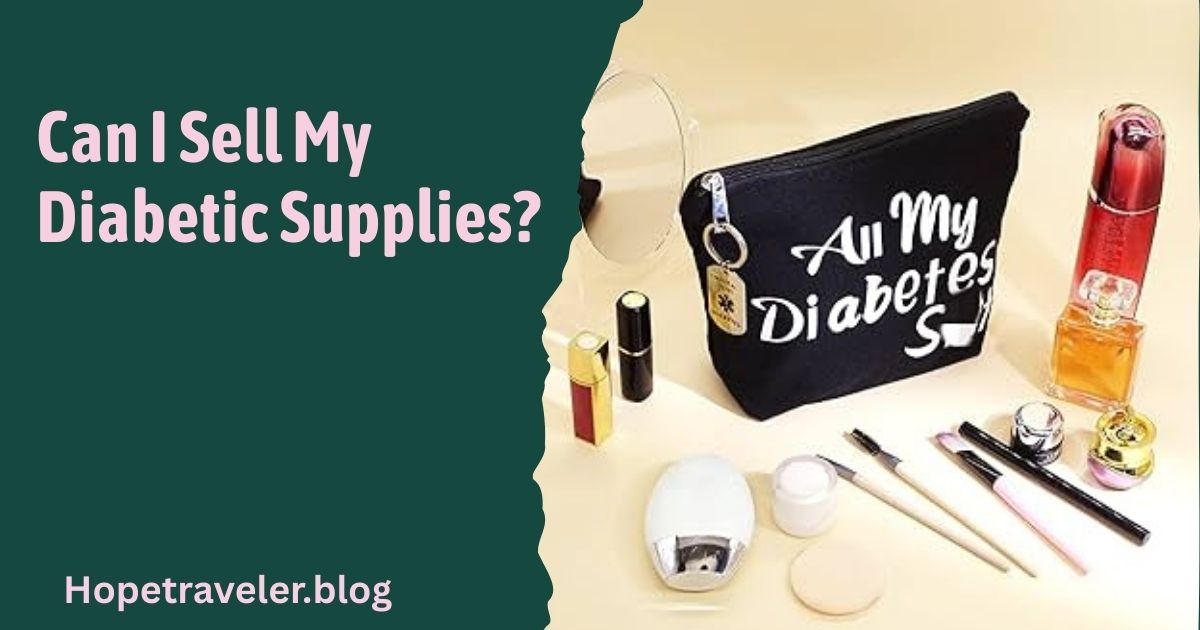Living with diabetes often means having to manage a variety of medical supplies, such as test strips, insulin pumps, syringes, and continuous glucose monitors (CGMs). Sometimes, people find themselves with extra supplies—perhaps due to a change in prescription, switching devices, receiving more than needed, or no longer requiring certain items. This naturally leads to the question: “Can I sell my diabetic supplies?”
The short answer is it depends—on the type of supplies, where you live, and local laws and regulations. Let’s break it down in detail.
Understanding Diabetic Supplies
Diabetic supplies generally fall into a few categories:
- Prescription items: Insulin, injectables, and certain continuous glucose monitors (CGMs).
- Over-the-counter items: Blood glucose meters, some test strips, lancets, alcohol swabs, and sharps containers.
- Durable medical equipment: Insulin pumps, smart pens, and related devices.
The ability to resell or donate these depends heavily on whether they are classified as prescription drugs or controlled medical devices.
For example, insulin is a prescription medication and cannot be legally sold by individuals. On the other hand, unopened, unexpired test strips may be legally resold in some states through certain channels.
Legal Aspects of Selling Diabetic Supplies
The legality of selling diabetic supplies varies depending on the country and even state laws.
United States
In the U.S., the Food and Drug Administration (FDA) and state boards of pharmacy regulate how prescription drugs and medical devices are distributed.
- Insulin and prescription CGMs (like Dexcom G6, Libre 3, etc.): Cannot legally be resold by individuals.
- Test strips and some meters: There are companies and marketplaces that legally purchase unopened, unexpired diabetic test strips. However, some states prohibit this resale.
Selling prescription diabetic supplies without authorization could lead to fines, criminal charges, or liability issues.
Other Countries
In many countries (such as Canada, the UK, and the EU), selling prescription diabetic supplies without authorization is also illegal. Often, the only options are to return them to a pharmacy, donate them through approved programs, or safely dispose of them.
Risks of Selling Diabetic Supplies
Even if some items can legally be sold, there are risks:
- Legal Risks – Selling prescription-only supplies without a license is illegal.
- Health Risks – Improperly stored supplies (like insulin left in heat) could harm buyers.
- Fraud and Scams – Many online “buyers” of diabetic supplies operate illegally or scam sellers.
- Ethical Concerns – While some people need affordable supplies, improper resale can contribute to counterfeit or unsafe medical markets.
Alternatives to Selling Diabetic Supplies
If you have extra supplies, there are safer and legal alternatives:
1. Donation Programs
Many nonprofit organizations accept unopened, unexpired diabetic supplies:
- Insulin For Life (IFL): Helps redistribute supplies to people in need.
- Life for a Child: Supports children with diabetes in underserved countries.
- Local free clinics or diabetes support groups may accept donations.
2. Pharmacy Take-Back Programs
Some pharmacies allow customers to return unused supplies for safe disposal or redistribution.
3. Giving to Friends/Family (With Caution)
While not always recommended, some people give unused supplies to others they know personally who need them.
Why People Want to Sell Extra Supplies
The high cost of diabetic care in countries like the U.S. has fueled a secondary market for test strips and other supplies. For some people, selling their extra test strips provides quick cash, while buyers get cheaper alternatives than retail prices.
However, while this may seem like a win-win, it exists in a gray legal area. It’s important to research your state’s laws before attempting to sell supplies.
Final Answer: Can You Sell Diabetic Supplies?
- Insulin, prescription CGMs, and pumps: No, you cannot legally sell these. They are prescription-only.
- Unopened, unexpired test strips and meters: Sometimes yes, depending on state and country laws.
- Best option: If you have extra supplies, consider donating them to legitimate organizations.
Related Resource
For further background, you can explore Diabetes management on Wikipedia, which covers the broader context of diabetic care and supplies.
✅ In conclusion: While you might be able to sell some non-prescription diabetic supplies like test strips, selling insulin or other prescription items is not legal. The safest and most ethical choice is to donate or properly dispose of extra supplies to help others who may desperately need them.




